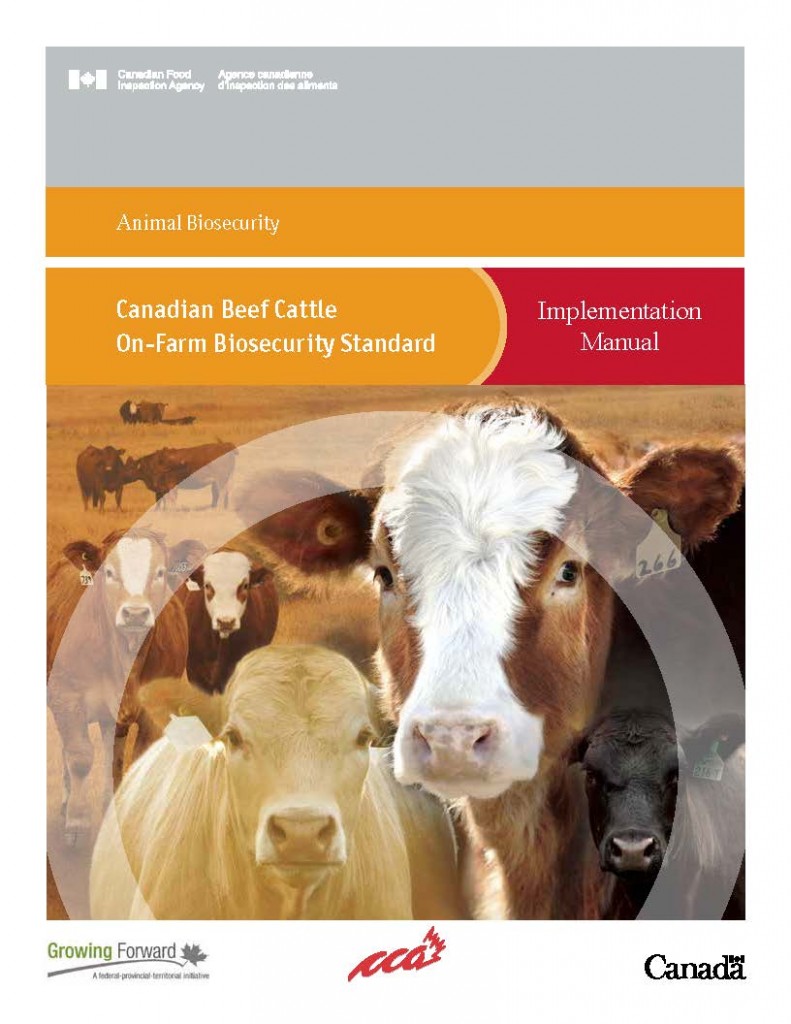On-Farm Biosecurity Protects Cattle Health: Producer Manual Now Available
Biosecurity: Those practices that prevent or mitigate disease from entering, spreading within or being released from operations that may contain livestock. (source: Canadian Food Inspection Agency)
Cattlemen understand the devastating potential of the introduction, re-occurrence or spread of cattle diseases, and recognize the need to manage risks to protect the viability of their operation. While “biosecurity” is not a term that cattle producers regularly use, many common sense practices already being done on farms across Canada are in line with biosecurity as part of everyday risk management.
Animal health issues can be very costly to producers through lost productivity (weight gain, reproduction, etc.), treatments and animal death. For example, bovine respiratory disease (BRD) accounts for 65-80% of sickness and 45-75% of deaths in some feedlots. The same practices that prevent or mitigate the impact of common health risks (like BRD and calf scours) also work against foreign animal disease outbreaks (such as Foot and Mouth Disease).
It is important for producers to stay educated about sound biosecurity practices. Prevention of disease spread is becoming an increasingly important facet of livestock production as profit margins tighten, consumers are more aware of food safety news, and global travel continually increases the threat of foreign disease. By practicing sound biosecurity, producers protect the health and profitability of their own livestock, their neighbors’ herds, and Canada’s beef industry as a whole.
The Canadian Beef Cattle On-Farm Biosecurity Standard is a valuable resource developed for the industry focused on reducing the risk and impact of disease in cattle operations across the country. It outlines science-based, practical and effective on-farm biosecurity practices specific to Canadian beef cattle that are low cost to the producer.
The Standard is built on four basic principles of on-farm risk reduction:
- managing and minimizing animal movement risks;
- managing the movement of people, vehicles, equipment and tools;
- managing animal health practices; and
- the biosecurity knowledge and training of personnel on the operation’s biosecurity plan.
By reviewing the Standard, producers can:
- understand the science, logic and importance behind biosecurity principles
- learn about biosecurity risks not yet considered
- improve the way biosecurity practices are implemented on-farm to make them more effective, or reduce the time or costs of implementation
The Standard, which was developed over two years in consultation with producers, researchers and other industry experts, was released in March 2012. A complementary Biosecurity Implementation Manual is now available. The manual provides practical guidance to cattle producers on how to implement recommendations in the Standard.
Examples include:
- Segregate and when warranted vaccinate, test, and otherwise treat, incoming animals
- Obtain and share information about comingled animals with previous and future owners
- Apply sanitation practices that are relevant to personnel, visitors, vehicles, equipment, and tools on entry to, within, and on exit from production areas
- Post biosecurity signs at access points to production area and farm yard
- Manage livestock to reduce exposure to wildlife to the extent practical
- Establish and maintain a working relationship with a veterinarian
- Manage herd health according to a documented Herd Health Plan (HHP), prepared in consultation with a veterinarian
- Ensure that personnel understand how and why biosecurity is applied on their operation
- Ensure that personnel know how to respond to the range of animal health situations typical to the operation
For more information on biosecurity or how to customize a biosecurity plan that suits your operation, contact your veterinarian.
Learn more
- Animal Biosecurity (Canadian Food Inspection Agency)
The sharing or reprinting of BCRC Blog articles is welcome and encouraged. Please provide acknowledgement to the Beef Cattle Research Council and list the website address, www.BeefResearch.ca.
We welcome your questions, comments and suggestions. Contact us directly at info@beefresearch.ca or generate public discussion by posting your thoughts below.
Stay connected by following us on Twitter @BeefResearch, liking us on Facebook, and subscribing to our YouTube Channel.
Click here to subscribe and receive email notifications when new content is posted on the BCRC Blog.
